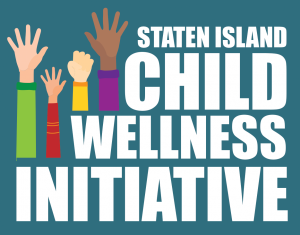Coalition Launches Staten Island Child Wellness Initiative to Address Childhood Obesity
STATEN ISLAND, NEW YORK (June 7, 2017) – With a staggering 38.9 percent of Staten Island students in Kindergarten through 8th grade classified as either overweight or obese, a new coalition has formed to reduce childhood obesity and the associated burden of chronic illness to ensure that SI children have a healthy future.
The Staten Island Child Wellness Initiative (CWI) launched today during an event at the Ocean Breeze Athletic Facility to coincide with Global Running Day. The event, sponsored by the Office of the Borough President James S. Oddo and The Staten Island Partnership for Community Wellness (SIPCW), was supported by New York Road Runners and the New York City Parks Department.
The CWI is a cross sector coalition of more than 60 organizations, comprised of community stakeholders, schools, community-based organizations, youth-serving organizations, food justice partners, healthcare systems, elected officials, faith-based leaders, parents, and children from Staten Island and New York City who have come together to fight the alarming levels of childhood obesity on Staten Island.
The idea for the CWI was generated out of a series of meetings of Borough President Oddo’s Health and Wellness Advisory Council when participants engaged in spirited discussions about how they could have the greatest impact on Staten Island’s health outcomes, particularly young people. Thanks to generous funding from The Staten Island Foundation, and a strong partnership between Borough President Oddo and SIPCW, the SI CWI has worked tirelessly on creating a thorough and ambitious action plan working to increase opportunities for healthy living where children and families live, learn, and receive care.
“Back in 2015 my Health and Wellness Council and I decided to focus on childhood wellness as the specific area where we should focus our attention and resources to make a maximum impact on the health of Staten Islanders,” said Borough President Oddo. “As someone who visits many of our schools on at least a monthly basis, it is clear to see that childhood obesity is a real problem that must be addressed to prevent a lifetime of illness. That is why I am working so hard on piloting a new model for physical education based on the Naperville, Illinois experience reported in the book ‘Spark’ by Dr. John Ratey. The CWI is ambitious, but so necessary, and I thank my partners at SIPCW and so many others for all their work thus far and to come.”
“By working together with partners across Staten Island to address this urgent issue, we can shape a healthy future for our children, and reverse the rising rates of obesity in our borough,” said Adrienne Abbate, Executive Director of the Staten Island Partnership for Community Wellness. “Although this is a borough-wide initiative, the CWI will use data to target communities and neighborhoods that have higher need and poorer health outcomes.”
By 2026, the CWI aims to improve child health and wellness on Staten Island by:
- Increasing accessibility and opportunities for active living
- Increasing the availability and affordability of fresh and healthy food
- Creating community-wide partnerships that shape the environment where a child lives, learns plays and receives healthcare
- Bringing 80 percent of Staten Island children below high school age to a healthy weight
The CWI’s progress will be measured by changes in BMI over time in Staten Island children.
Today’s event featured an array of speakers and presenters from across New York. Deputy Mayor Dr. Herminia Palacio and Dr. Abigail Velikov from the New York City Department of Health and Mental Hygiene spoke about the issue of obesity and presented the problem from a medical standpoint. Meghan Rossi, co-founder and chief operations officer of Moral Kings, discussed the importance of partnerships with parents and businesses. Staten Island Borough President James S. Oddo shared his support for the initiative in the closing remarks.
The CWI is actively seeking partners and funding to implement the blueprint across Staten Island. To make a donation, visit the CWI’s fundraising website. To learn more about the CWI and how you can get involved, visit SIPCW.org/childhood-wellness.
ADDITIONAL QUOTE
“We are proud to stand with Staten Island Borough President Oddo and the Staten Island Partnership for Community Wellness to support the Child Wellness Initiative and its mission to improve the quality of life for the young residents of Staten Island. The launch is an exciting addition to the roster of Global Running Day events in Staten Island, which includes an NYRR Open Run at Silver Lake Park,” said Mike Schnall, vice president of community engagement initiatives at New York Road Runners. “Since 1999, New York Road Runners has offered free youth running programs to kids across the country and here in New York City’s five boroughs. We have seen firsthand the health benefits associated with getting kids active from an early age.”
###
ABOUT SIPCW
The Staten Island Partnership for Community Wellness is a non-profit organization established to promote wellness and to improve the health of the Staten Island community through collaboration and a multidisciplinary approach. For more than 20 years SIPCW has addressed critical public health issues such as obesity, chronic disease prevention and behavioral health on Staten Island. Over the span of the past two decades, SIPCW has successfully convened stakeholders, enabled data-driven decisions and identified evidence-based strategies to collectively approach complex health issues for at-risk communities on Staten Island.

